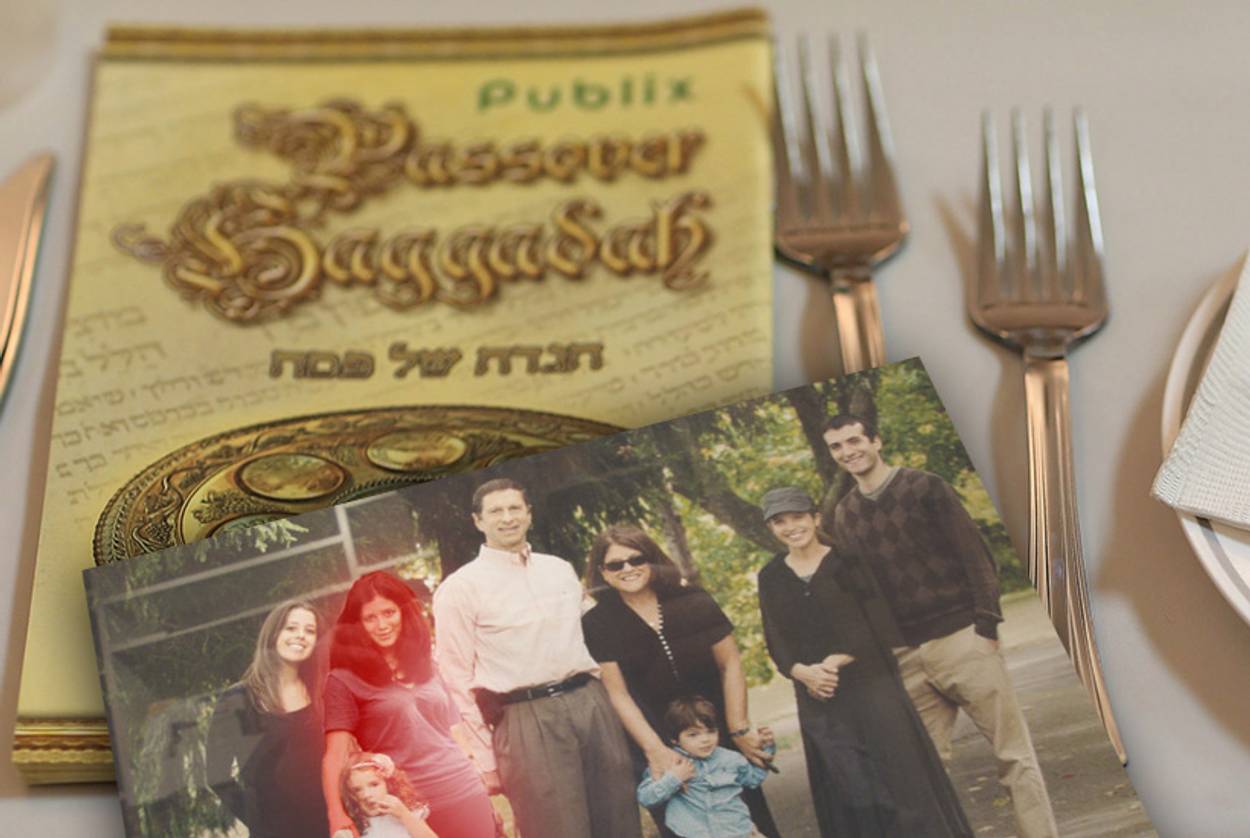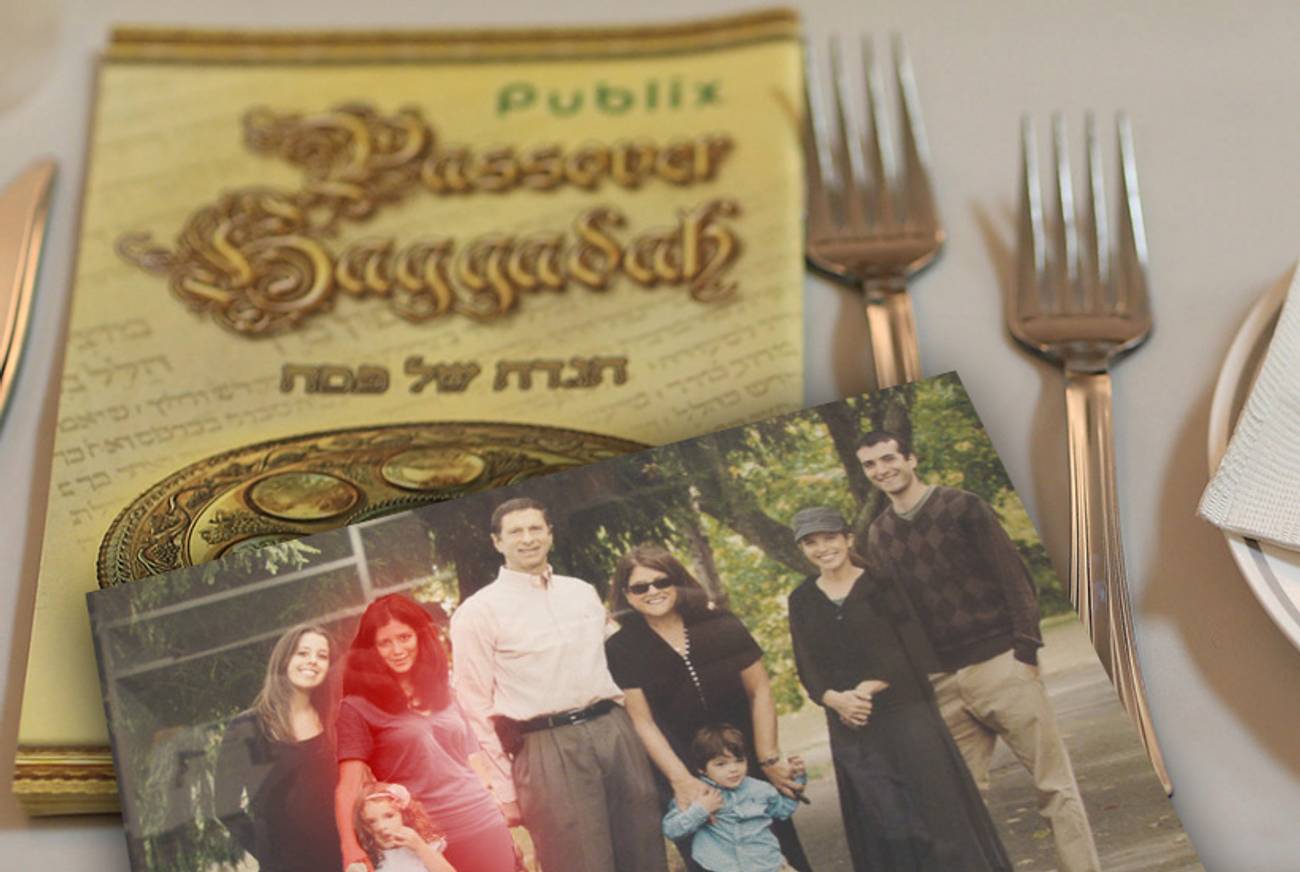Confessions of a Wicked Daughter
Every Passover, my family makes me the Seder’s “wicked son.” I don’t mind—it’s a part I was born to play.




I don’t particularly like my family’s Seders. They are long and boring, and (the year someone brought Ten Plagues finger puppets notwithstanding) each Seder is pretty much just like the last. We always start later than planned, forcing me to spend the first half of the evening starving and sneaking more salt-water-dipped-karpas than is permissible under halachah, at least according to my brother-in-law, our resident Orthodox rabbi. And while I happily comply with the Haggadah’s clear instructions to drink plenty of wine, this particular observance always engenders a certain amount of suspicion at the table. (“Are you sure that’s only your second glass, Deena?”) My usual move is to stay through the meal, “help” my mom with the dishes while everyone is benching, and eventually quietly drift upstairs to my bedroom, where I promptly fall asleep. I remember “Chad Gadya” fondly, but I can’t remember the last Seder when I was awake to sing it at the end.
Just as predictable, though, is what will happen after the salt water and the wine but before my early exit: When we get to the part about the Four Sons, the whole family looks to me to read the part of the rasha, aka the Wicked Son. In one of the best-known parts of the Seder, the Haggadah tells us the story of four children (all male, of course), characterizing them by the questions they ask. The chacham, or so-called wise son, wants to memorize the boring details: “Tell me the laws, the regulations, the ordinances.” The simple son, meanwhile, can only handle the broad strokes: “What is this?” he wants to know. The one who cannot even ask a question has nothing to say; the father has the imperative to open the conversation. But it is the one son who asks a real question, one that requires some original thought and an actual challenge, who we label “wicked.” And the question that has earns him this title? “What is this service to you?” By questioning his religious obligations and adding “to you,” he separates himself from his family and his community. Our response: We shun him right back. (“… because God took me out of Egypt, me and not you.”)
Every year, I’m the wicked one. Always have been. Always will be.
***
I can’t remember when I officially became the family rasha, but family lore puts it at around the time I introduced my third non-Jewish boyfriend. It didn’t matter that I was the only one of my parents’ three daughters with a job, paying my own rent, and headed to an Ivy League law school. Or that I was the only one to reliably send flowers on Mother’s Day, call my bubbe, and buy every single family member a Hanukkah present. What mattered was that I was breaking the cardinal rule of the Shanker household: Thou Shalt Not Have Gentile Boyfriends. Even if we lived an hour away from the closest Jewish community, even if my yeshiva had only one good looking guy in the whole high school (who would later marry Ivanka Trump), and even if my eventual transfer to public high school would introduce me to one cute goyishe boy after another.
But the truth is that I was the family rasha long before I met Andrew, my very first non-Jewish boyfriend, and I will likely remain the family rasha even after I meet the next one. (Sorry, Mom and Dad; I can’t promise the last one was the last. Is it my fault I have a weakness for handsome, hard-bodied men?) The rasha is not wicked for breaking the rules—he is wicked for questioning them, and I have been challenging convention, for better and sometimes for worse, for as long as I can remember.
The rabbis offer plenty of explanations for the nature of the Wicked Son, and the more of them I read, the more I realize that my family has it right about me. I am “wicked.” I do believe, as Rabbi Samson Raphael Hirsch said about the rasha, that I have “‘progressed’ far beyond [my] elders,” though I don’t think that makes me a “mocker”—just a liberal. I truly do not understand how an animal raised in the torture of a factory farm can be considered kosher, or why the fact that men can’t control their libidos means that women need to cover their hair. I cannot come to terms with Jacob stealing his brother’s birthright by tricking his blind, dying father; and I can’t help but notice that the whole scheme was organized by the one woman in the story, the mother. And I cannot believe that any just God would punish me for marrying a man I love, even if he is not a member of the tribe, has never been to a Seder before, and can’t pronounce l’chaim, chutzpah, or charoset.
Depending on whom you asked and when, Rabbi Yitzchak Sender’s explanations for the Wicked Son also work as descriptions of my own lifestyle choices. I might have outgrown the bacon-cheeseburger phase of my Jewish rebellion, having given up kashrut to become an unapologetic omnivore, before morphing into an ethical meat eater and then deciding to become a vegetarian who occasionally eats fried (organic, local, humanely raised) chicken. But it wouldn’t be off the mark to call me an “unregenerate heretic,” who despite being “educated in the ways of Torah … willfully and spitefully … reject[ed] everything [I] learned.” After all, it was me who, at 13, sat in the back of my yeshiva high-school classroom and challenged the rabbi to explain what was really so “blasphemous” about gay sex. And it was me, years later, learning Torah with my father and his rebbe, who explained—to their shared amusement—that I rejected the Torah’s notion of gender roles, and would never marry a man who wasn’t willing to help around the house. A product of both Solomon Schechter and yeshiva, I was always encouraged to ask questions—they were just supposed to be the right ones. (“Why do we have two Seders? Can’t we just have one?” “Deena, the real question is why we have any Seders at all.”) Sure, my sisters went through their own “rebellious” phases in high school; but even if they occasionally violated certain tenets by drinking too much on Simchat Torah or even eating hot wings at Hooters, neither veered as far as I did from the Nice Jewish Girl path—which I did by questioning those basic tenets altogether.
Sender’s other exposition of the Wicked Son, that he “has become blinded to the truth as a result of his having become accustomed to a lifestyle characterized by addiction to his own desires without restriction,” is also a fairly apt description of my lifestyle. But I don’t think my vices have blinded me to the truth so much as they have opened my eyes to it. It was only after smoking a pot-spiked hookah in my Hebrew University dorm room that I realized that a career in Middle Eastern politics would be futile for me, that the conflict was too entrenched, and that a Jewish girl from New York, no matter how well-meaning, was never going to be seen as an impartial peace broker. And as a strong believer of in vino veritas, I’ve come to consider alcohol a critical component of my writing career. (Hey, it worked for Hemingway.) If these things make me wicked, then wicked I am. But also fun-loving, truth-seeking, and honest.
Lucky for me, though, not everybody is so hard on the Wicked Son. My favorite interpretation comes from the Lubavitcher Rebbe, who tells us in a Chabad Haggadah that “there is only a slight distance between [the wicked son] and his [wise] brother.” My family has not officially chosen our chacham, but it seems like my brother-in-law, the Orthodox rabbi who comes to every Seder equipped with an all-Hebrew Haggadah penned by his grandfather, has more than earned the mantle. I might roll my eyes when he scolds me for eating too much karpas, but I also recognize that there are reasons behind the limits he is imposing, and that they were probably discussed, dissected, and ultimately determined by a long series of arguments based in both Torah and logic. But while I appreciate that there are people learning all of these rules, I also want to thank the Lubavitcher Rebbe for recognizing that we rashas could memorize the laws and regulations, too; we just choose not to. Like the great rashas before me, from Betty Friedan to Larry David, I know the social norms and conventions; I simply reject them. Any chacham can learn the rules of kashrut, tzniut, or a conventional marriage. But it takes a rasha to ask why we have these rules at all.
***
Like this article? Sign up for our Daily Digest to get Tablet Magazine’s new content in your inbox each morning.
Deena Shanker is a writer living in New York. Follow her on Twitter @deenashanker.
Deena Shanker is a writer living in New York. Follow her on Twitter @deenashanker.